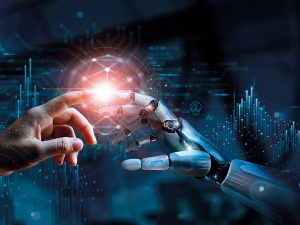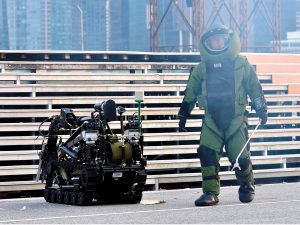Have you ever come across videos or photos of ‘hero’ robots tackling hazardous tasks such as fighting a wildfire or sanitising hospitals during the COVID-19 pandemic? Whereas robots were once limited to industrial automation, we now see them increasingly deployed in service domains like disaster response to improve human safety and well-being. It seems that WALL-E, the endearing cleaning robot from the 2008 Pixar movie, has found its real-world counterparts.
The Unexpected Effect of Robotic Progress
This robot progress prompts an important question: If robots now help humans with such tasks, does that make humans more prosocial or less prosocial? Our recent research sheds important light on this issue. The research, published in the Journal of Consumer Psychology, reveals that while robots doing dangerous jobs are seen as efficient helpers, they do not inspire people to step up and help others. In other words, our research indicates that people’s willingness to engage in prosocial behaviours decreased significantly when they watched robots (as opposed to human workers) assist in disaster scenarios. In short, ‘hero’ robots inadvertently diminish our human qualities.
For instance, in one experiment, we presented participants with narratives derived from actual news reports depicting the efforts of people or robots to disinfect hospitals during the COVID-19 pandemic. Some narratives highlighted human workers, while others highlighted robots. We measured how likely participants would be to help other vulnerable people in a subsequent task. The study revealed that participants displayed a reduced inclination to extend a lending hand to others after reading about robots helping rather than humans helping.
High Efficiency With Diminished Inspiration
The implications of these findings are profound. It appears that the presence of ‘heroic’ robots, while significantly enhancing efficiency, fails to inspire empathy and prosociality among observers. This raises questions about the impact of robot involvement on our innate desire to help others in times of crisis. Our further exploration into this matter revealed two primary reasons why ‘heroic’ robots fail to inspire. Firstly, robots lack agency and autonomy, which prevents them from taking credit for their virtuous actions. Additionally, robots face fewer risks and dangers than people. Therefore, while courageous humans inspire others, robots, by contrast, fail to generate such motivation due to their low vulnerability and low autonomy.
Reaffirming Humans in Disaster Response
Some solutions to this dilemma: 1) put people front and centre; 2) highlight the efficiency of robots; 3) humanise robots to increase their autonomy and vulnerability.
Based on these findings, we offer a few suggestions to address this dilemma. Firstly, while robots are highly efficient, organisations should bear in mind that when disasters occur, human help may remain the default assumption among the general population. Therefore, to avoid disrupting people’s prosocial intentions, journalists should put human workers front and centre in these news stories. At the same time, emphasising robots’ efficiency may help counteract individual feelings of powerlessness during catastrophic events.
Adding Human Elements to Robots
Moreover, humans are not inspired when confronted with robots that are simply programmed to perform tasks. Therefore, imbuing robots with human-like characteristics, such as autonomy and vulnerability, could increase their perceived bravery and, consequently, their ability to inspire us. In addition, our study suggestes that creating hybrid human-robot teams is another viable option to elevate robots’ humanness and thus achieve the same objective.
Reshaping Human-Robot Collaboration
In light of society’s increasing reliance on service robots in various domains, our research highlights the need to rethink our perspective on technology. We need to focus on designing technology that not only optimises efficiency but also inspires people to act prosocially. In the future, people and robots will increasingly collaborate in disaster response and other difficult tasks. These insights have significant implications for leveraging technology for the betterment of society as a whole.
Authors:
Chen Fangyuan is an associate professor of marketing in the Faculty of Business Administration and a member of the Asia-Pacific Academy of Economics and Management at the University of Macau. Her research focuses on using anthropomorphism and social perception theories to understand consumers’ interaction with non-human entities in the marketplace.
Huang Szu-chi is an associate professor of marketing and R. Michael Shanahan Faculty Scholar at Stanford University. Her research focuses on consumer motivation, including what drives people to donate to non-profits or volunteer to help others.
Text / Chen Fangyuan & Huang Szu-chi
Chinese Translation / Davis Ip
Source: UMagazine ISSUE 28




